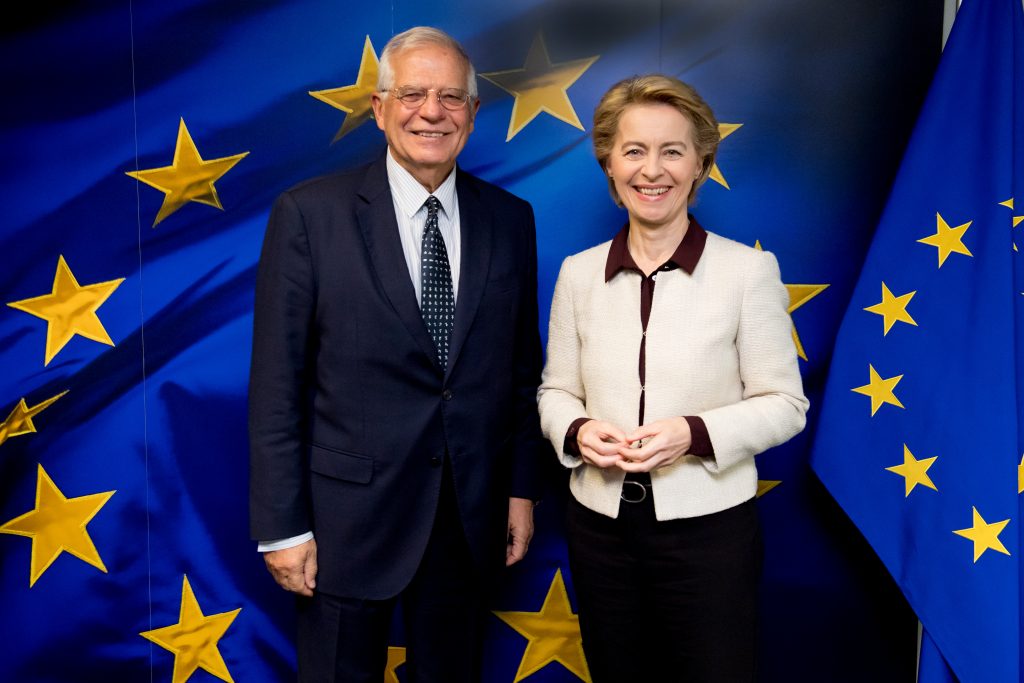 Mario Telò is professor at LUISS and Université libre de Bruxelles, and President emeritus of the IEE-ULB. He is a member of the Royal Academy of Belgium.
Mario Telò is professor at LUISS and Université libre de Bruxelles, and President emeritus of the IEE-ULB. He is a member of the Royal Academy of Belgium.
There will be no future for the EU without a strong and strategic link between the needed internal reforms and an enhanced international role for the Union. The ambitious challenge of the next Conference on the Future of Europe must be to answer the question: how can the EU[1], through a deeper cooperation and integration process, not only survive, but also shape a multipolar, non-European world and its governance under the standard of its own interests and values, including, first of all, the proactive promotion of multilateral convergences for the common good – peace by framing conflict prevention, public health (notably by universal vaccination), humanizing and regulating globalization, protecting the environment, sustainable development, and fair and just regulation of the globalized economy and trade?
There are many uncertainties regarding the main objectives of the announced “Conference on the Future of Europe”. If this necessary moment of collective rethinking, after the tremendous changes and crises of 2020 (on the one hand the Brexit and the pandemic, but on the other, the historical decision to fund the most integrative European project, since decades, the “Recovery plan”) is not going to put at its core the objective of strengthening the EU’s role in the world, the risk is a tragic step back comparable with potentially similar creative moment in the recent past. We remember 2001, when the wide debate on the mandate for the European Convention focused on two objectives, very well stressed by the “Laeken declaration”: the EU’s internal democratization and its international role. The outcomes of several years of collective and controversial endeavours were relevant decisions and Lisbon Treaty provisions, namely the EU’s legal personality, the creation of the European Union External Action, the comprehensive concept of external relations and the double function, at least on paper, for the High Representative for Common Foreign and Security Policy’s as the responsible coordinator of all external relations.
This largely successful exercise should be a reference for the current moment of renewal. Why? Because to reach them, objectives were always strictly linked to the institutional modes of governance.
Five analytical findings
After 20 years of proactive coordination of global networks and collective research endeavours (from Garnet to GEM) we would like to underline five analytical findings and then try to shape our recommendations through five agendas.
Is the global context allowing new actors like the EU to emerge?
Despite many uncertainties, the global context is evolving towards an unprecedented multipolarity, asymmetric and bifurcating at the same time, combined with a multi-layered, multilateral network which is to some extent very critical and to some extent resilient/dynamic.
Why asymmetric? The United States, our main ally, remains by far the main superpower. The rhetoric about China’s strengthening military competitiveness does not stand against statistic data showing that China’s defence budget, even last year, was 6 to 7 times lower than that of the United States. However, research tells us that evident military primacy does no longer mean the constructive hegemony of the times of Roosevelt and Kennedy, not even of Clinton.
For the purposes of the European nuclear and non-nuclear security, the EU needs to combine the objective of an “open strategic autonomy” with a new transatlantic deal for the coming 20 years (and benefit of the article 5 of NATO). What is new (Merkel, Macron and other leaders) is that the EU cannot only rely on the USA for security: even the Eurobarometer shows how EU citizens are worried about the relevance of American domestic politics by provoking oscillations as the US will (and capacity) of leading global cooperation and the necessary changes: The Financial Times pointed out that Biden will often be obliged to choose between internal consensus and leading global change.
The second global evidence is the dramatic economic power shift
Since 2007, the BRICS[2] overtook the West by share of global GDP; China is already the largest global economy in PPP[3], as well as the number one import and export power and the first EU’s trade partner. This is an unprecedented historical reality: an authoritarian regime (with poor human rights record) is the first global economy, a highly internationalized, interdependent and technologically advanced country.
Beyond Asia/Pacific states, the most important democratic entities –Japan, Korea, Australia, New Zealand,[4] as well as Switzerland, Brazil and even the United States— have signed arrangements with China through, respectively, the recent Regional Comprehensive Economic Partnership and the “Phase One deal.[5]” This is the context of the EU-China Comprehensive agreement on investments (CAI) signed on December 30th, 2020.
The third evidence is to some extent a consequence of the first two
The multipolar global order is increasingly bifurcating between the United States and China: trade wars, technological digital competition, split of supply chains, upgrading mutual threats and political rhetorics. The risk of a second Cold War is not an abstract scenario: it is a matter of everyday decisions and openly considered as inevitable by relevant scholars on both sides (Yan Xuetong 2020, John Ikenberry2020, Graham Allison 2018). How does the EU cope with this strong trend?
The fourth finding of our research shows that the multilateral institutionalized network is in transition
Between, on the one hand, a very critical legacy of the past, dramatically affected by efficiency- and legitimacy- deficits (UNSC paralysis, WTO dead lock, WHO poor performance during the pandemic) and, on the other hand, the multiple, multilevel, tendencies of multilateral resilience and even renewal: multiplying networks of civils society, emergence of new actors, new regimes (COP21), new opportunities and ways for multilateral governance, notably the consolidation and expansion of various types of regional organization in every continent. The EU as regional organization is not an isolated case; cooperation with many like-minded countries (Canada, Japan, S-Korea, Australia…), regional entities, including ASEAN, the African Union and CELAC, makes of multilateralism an alive and diverse reality, matter of the free activities of thousands of networks of the civil society.
The world is not only a valley of lions, a field of hard competition. Even Graham T Allison in his book too shortly summarized as announcing “a coming Thucydides trap” shows that institutionalizing international life as a rule-based sphere may be an alternative to a global military conflict between the emergent and the forthcoming superpower.
The EU’s future as a multilateral entity is directly linked to the survival and reform of the multilateral network, as well as the future of multilateralism is to a large extent depending upon the EU driving role.
Fifth and final research finding: the EU is stronger in 2021 than in 2001
It survived the worst economic crisis since 1929 by further integration and it survived the many dismantling policies decided by the President of the superpower which was the crucial supporter in the European community foundation in the 50s and 60s: the United States. Moreover, the EU was able to successfully cope with the populist wave, including Brexit, by new steps in its unity and integration process. Brexit was sad news but it created the conditions for PESCO in 2018 and the Recovery plan in 2020-21, funded by common debt and EU budget. The EU is not only a regional entity, not only an actor, but also a distinct type of incipient international power. By power I mean as Norberto Bobbio (1999): be capable of changing the other’s behaviour even against its will. Despite recent humiliations in Moscow from Lavrov and in London from Johnson (downgrading diplomatic representation) the Europeans should be made aware of such historical achievements. The EU is a strange, distinctive kind of power, a civilian power, still a military dwarf, who will not use military tools as main instruments of foreign policy, but diplomacy, trade arrangements, cooperation, currency and cultural influence, including the culture of regulating markets by high standards, regulating globalization and, hopefully, also the digital technology.
Five agendas for the CFSP, the EU’s external relations in the perspective of the Conference on the Future of Europe
In the described context, the EU has many cards to play on the basis of the will of an enhanced “Strategic autonomy” stressed by the HR J. Borrell.
- 1) If the EU interest is containing the strong current trend towards a new Cold war, negatively affecting the EU’s role and risking to transform Europe in to a playing field between the United States and China, this priority should be underlined; as a consequence, the only remedy is promoting multiple multilateral coalitions, fora and regimes, revive multilateral organizations, with the participation of civil society. The HR and Commission Joint Communication of February 17th is a constructive statement supporting Multilateralism. However, its priorities are not always precise enough regarding how to ensure the future of multilateralism and the EU within it. Research may help reach further progresses.
With reason, the Franco-German 20 November 2020 Declaration (Le Drian-Maas) did assert the European alternative to Cold war, that is the perspective of a new “Alliance for multilateralism”, whereas the Cold war scenario would divide the current and potential multilateral coalitions for common goods and weaken multilateral regimes and organizations: firstly, the UN and the Antonio Guterres strategy for a serious UN reform but also the WTO, COP 26, WHO and also G20.
The main EU role is that of bridge-maker, regime building at global, regional and interregional levels leading the process of multilateralizing multipolarity. Combining it with the objective of “bilateralizing multilateralism” would give the feeling that, for the EU multilateralism is an instrumental tool, while it is a value for it, a way of life and a fundamental strategic choice.
Secondly, since “the status quo is not an option”, defending multilateralism is only possible by reforming it[6]. That’s why the EU is politically obliged to promote various functional coalitions. For example, if it is confirmed that China is in favour of strengthening COP 21 towards COP 26 but is not ready to reform the WTO, Europe must look at a potential convergence with the United States as main partner of a transatlantic deal for a stronger WTO.
- 2) On February 18th, the DG Trade published a policy paper with the nice title “An Open sustainable and assertive trade policy strategic autonomy.” This looks as a very positive development of the foreign policy itself. Why? Because a priority is preventing protectionist interpretations of strategic autonomy, which would strengthen the criticism of external observers arguing that, after Brexit, the EU will inevitably become a protectionist fortress. Protecting the citizens from negative effects of globalization, does not mean at all shifting to protectionism. The EU must show that an open trade policy is compatible with both political strategic autonomy, and the internal consensus. How? By an internal convergence on the best practices. Sweden looks like the best model, combining trade openness with domestic public policies, the famous AMS, supporting the internal victims of open trade by professional training. Furthermore, trade policy should be parallel to industrial policy in strategic sectors (including health, vaccine production and digital) as emphasized, among others, by the French government. This is the progressive way against the multiple protectionist streams.
- 3) Is this open approach to trade compromising too much about the value of human rights international protection and is it too “naïf” in dealing with authoritarian regimes like China and Russia? Given the Treaty, the EU must put human rights and democracy promotion at the top of tits agenda. However, which is the best way to defend human rights and promote democracy?
The UN general secretary A. Guterres mentioned several times the reference to the “Helsinki process”. In 1975 when the CSCE was established as outcome of the famous Helsinki conference, the idea of its promoters, from H. Schmidt to B. Kreisky, from O. Palme to A. Moro, among others, was to change the authoritarian Eastern European regimes, through dialogue and a three pillars cooperation: security, economy, culture and human rights. The URSS and the Soviet bloc were totalitarian systems, much more than Russia and China now are. Macron argued with right that some comments risk to apply to these authoritarian regimes, an old and anachronistic Cold war conceptualization; while they, and notably China, are much more integrated in the global interdependent economy and also in the multilateral system: changing the authoritarian regimes by HR promotion is a priority, but this can only be achieved through a more binding dialogue and cooperation.
- 4) With reason, Josep Borrell argues that with such authoritarian regimes the EU must use the language of power. I would nuance: its distinctive language of power: what its distinctive language of power is about? Research is clear: the market power and the trade power are the most effective leverages of the EU international effective influence. Unfortunately, the foreign policy is not coordinated enough with the assertive trade and investment arrangements negotiated by the Commission. Enhanced efficiency must be combined with legitimacy. When it comes to the challenge of ratification, the sustained dialogue with the European Parliament should ensure internal legitimacy according to the Treaty of Lisbon.
The successful negotiations with China, with Vietnam and with MERCOSUR (including a Bolsonaro-lead Brazil, who was forced to make a U-turn regarding his electoral program of leaving COP 21) clearly show than, when it acts like this, in spite on internal controversies and external time-consuming obstacles, the EU reaches its objectives; when it does not use these leverages and only pleas for human rights in rhetoric ways, the EU fails. There are two ways of being a normative power: as a propaganda activist or as an effective transformative power through trade and investments negotiations, aid to development and comprehensive interregional agreements.
Even regarding the dramatic persecution and forced labour of the Uighurs in Western China, through the CAI, the Commission obtained, after 7 years of hard negotiations, unprecedented concessions from China (the commitments for “sustained endeavours for labour rights, against forced labour”). It is astonishing the communication deficit about EU’s achievements: a communist country accepted the perspective of liberalizing worker’s association; and a monitoring process is created for this crucial “sustainable development chapter” of the Agreement. Which is a realistic alternative, since it is clear that “containment is not a feasible option”, as recently Martin Wolf wrote on the Financial Times[7]?By which right is J. Sullivan, the United States National security advisor, criticizing the CAI when even the USA signed an agreement with China one year before? Open strategic autonomy is needed, and will be impossible without cooperation, engagement and an assertive combination of values and power.
- 5) Finally, what about the reform of the EU itself? Is the EU in condition to consistently conduct these policies? Or are they mere matter of wishful thinking? The answer is: yes, the EU has its cards to play, but only provided some relevant internal and external conditions.
We already analysed the alternative scenarios of the global context and the one which is allowing the EU to emerge as actor and power. We add that the EU’s formal recognition by international organizations will be an essential step. [8]
Furthermore:
- At level of the UN governance reform, the Joint Communication (February 21st) proposal of an Annual meeting of the UN with the heads of regional organizations will be crucial in the long term perspective of regionalizing the United Nation system. We advanced concrete ideas about how to scrutinize and select them according to their consistency with multilateral principles and procedures.
- All the EU’s strategic partnerships and multipurpose interregional relations with East Asia, Africa and Latin America, should be upgraded in their political dimension and supported by strong trade and investment agreements as drivers.
- Reorganizing the interplay with the near abroad is a priority for every would-be power: the Mediterranean area and Eastern Europe should be reorganized by a far-seeing EU’s initiative for this great macro-regional space, by concentric circles of cooperation and various degrees of cooperation with the hard core (the Eurozone). No actor becomes a true power without organizing the near abroad: the UK, Turkey, Ukraine, the southern rim need, each, distinctive partnership proposals. Despite controversies, taking the political initiative is precisely the responsibility of the regional leader.
Internal conditions
Under which internal conditions is an open strategic autonomy a realistic avenue? First, the political will of strategic autonomy should prevail against internal veto-players. How? By enhanced legitimacy and efficiency of the CFSP and external relations. Nobody stresses enough that foreign policy provides an opportunity for mobilizing public opinion for more Europe. Further Europe’s integration starts abroad by successful external relations.
What about the implications at level of EU’ institutions, governance and capabilities?
First, in case the Conference on the future of Europe makes the perspective of a dynamic mandate for a Convention and a treaty reform, some avenues must be proposed: Qualified majority voting (QMV) in the foreign affairs Council, in case of serious and persistent Human rights violation. In case no treaty change is possible, the governance of external relations and Common Foreign and Security Policy may be improved by various provisions offered by the Lisbon treaty to diminishing the weight of veto players:
- Passerelles from unanimous vote to QMV as in a recent Document of the Council and in the February 21st Joint communication quoted above.
- Moreover, the coordinating role of HR of all external relations must be truly implemented. It was missing in the case of C. Ashton (focusing on EEAS construction), and is still quite weak during the Mogherini and Borrell mandates, even if Mogherini established an interesting governance reform: the CGEA (Commissioners’ Group on External Action) meeting on a regular basis. According to the treaty, providing the HR with double hat, this political rule should be implemented consistently and along all international arrangements. We note that critics to CAI did not come from the trade secretary but from the NSA of the Biden administration.
- The TEU Art 46 allowed PESCO to be founded (2018) showing the potentials of intergovernmental coordination. Monitoring the follow-up is however crucial: the effective increased capacity building by each of the 25 member states.
- In the same spirit and context the question of “the European army” should be put on the agenda. Beyond rhetoric’s, we are aware of obstacles. The EU needs a frank debate about this question addressed by Jean-Claude. Junker in 2014 and recently (2020) by a more credible proposal by the SPD parliamentary group at Bundestag. It might not be realistic to propose a single EU army now (which would require a new treaty similar to ECD of 1952, failed in 1954); what looks more feaseble is a development of a 28th army, not with aim of replacing the 27 national armies, but complementary to them for common EU’s missions, in the framework of the “Peterberg tasks” and the necessary independent support and protection of civilian missions.
- Finally, in case the political will is there, the TEU Art. 20 for enhanced cooperation offers the chance of improving the possibility to act in foreign policy, the quick reaction to dramatic emergencies.
Conclusion: a “Spinellian moment”?
In January 2021 we celebrate the 80th anniversary of the Ventotene Manifesto, the founding paper of European construction, drafted by A Spinelli and his colleagues during his fascist detention. Would not be a largely consensual idea proposing to make of 2021 a “Spinellian moment” for the EU? The Brussels parliament building is dedicated to Spinelli, driver of the EU democratization process.
In a period where the EU needs both more democracy and enhanced strength in the world, why should citizens feel enthusiasm for an “Hamiltonian moment”, quoted by Wolfgang Schäuble after the journal “Economist”? Hamilton’s fight, for all his life, was aiming at building the USA, while the EU cannot become a second USA; while Spinelli well represents not only the federalist idea, but a much larger array of forces and hopes for European unity rooted in every member state and political culture, an ambitious European project, including a distinctive idea of European modernity in the world.
By such a symbolic reference, the Conference on the future of Europe and other initiatives of 2021 could make the EU’s “open strategic autonomy” more credible, abler of representing an inspiring political and socio-economic model in the current uncertain world.
References
Main photo: Ursula von der Leyen, on the right, and Josep Borrell, on the left.
European Union, 2019/Source: EC – Audiovisual Service. Photographer: Etienne Ansotte
[1] An EU that represents only 5% of the global population but is comparable with the United States and China in terms of GDP (15,4% in 2019) and trade power (15%)
[2] Brazil, Russia, India, China and South Africa
[3] Purchasing power parity
[4] RCEP (15.11.20)
[5] In January 2020
[6] Mario Telò (ed), Reforming Multilateralism in Post-COVID times. For a more regionalised, binding and legitimate United Nations, with contributions by A.Acharya, Qin Y.,L.van Langenhove, N.Schrijver, M.J.Rodrigues, N.Tocci, Jo Leinen, P.Guerrieri, Ruth Rubio, P.Padoan, A.Vasconcelos,A.Gamble, Brussels, 2021
[7] Date: 21.2.2021
[8] See the table published in :Mario Telò (ed), Reforming Multilateralism in Post-COVID times. For a more regionalised, binding and legitimate United Nations, with contributions by A.Acharya, Qin Y.,L.van Langenhove, N.Schrijver, M.J.Rodrigues, N.Tocci, Jo Leinen, P.Guerrieri, Ruth Rubio, P.Padoan, A.Vasconcelos,A.Gamble, Brussels, 2021).




